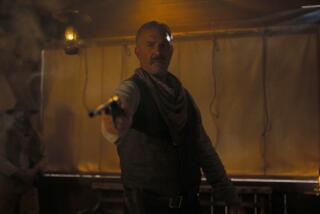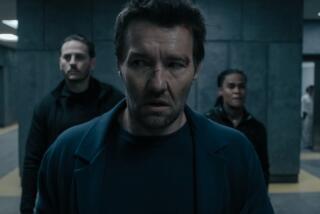A difficult destination ultimately reached
Some novels, even the most potentially cinematic, initially resist being made into films, and so it is with “The Golden Compass.”
Watching writer-director Chris Weitz’s ultimately satisfying and successful version of the opening volume of the celebrated “His Dark Materials” trilogy, you can feel the strain of fitting Philip Pullman’s dazzling feat of sophisticated imagination onto the screen, even with the luxury of a reported $180-million budget.
For Pullman’s books, the most literate and intellectually exciting fantasy novels since “The Lord of the Rings” trilogy, are works of startling richness. They posit a world parallel to and similar to our own but with key differences, the most noticeable being the existence of daemons, small talking animals of varying sorts who walk next to the humans they are connected to and are the physical manifestation of their souls.
The story of “The Golden Compass” is the story of Lyra (newcomer Dakota Blue Richards), a feisty 12-year-old who lives without parents as a ward of one of Oxford’s colleges. In an attempt to rescue one of her small friends who has gone missing for mysterious reasons, Lyra goes on a journey to the far north that involves her explorer uncle, Lord Asriel (Daniel Craig), and Mrs. Coulter (Nicole Kidman), a powerful woman who’s taken an interest in the youngster.
To put Lyra’s mind-bending, almost unimaginable world on screen, to create a reality where flying witches share the skies with antiquated airships, enormous talking armored bears fight to the death and daemons walk and talk in almost every frame is a monumental challenge and one that the film handsomely meets.
Working with production designer Dennis Gassner and cinematographer Henry Braham, senior visual effects supervisor Michael Fink has turned “The Golden Compass” into a formidable piece of craftsmanship, using some 1,100 effects shots to bring forth a physical space that has the ability to take your breath away. And using top talent such as Kathy Bates and Kristin Scott Thomas for the voices of the daemons, not to mention the peerless Ian McKellen as the armored bear Iorek Byrnison, also adds to the verisimilitude.
Difficult as all this is to accomplish, getting the story’s philosophical underpinnings and dramatic intricacies on screen is even harder. Whenever a book like “The Golden Compass” gets turned into a movie, it’s inevitable that the story will be simplified, characters will lose nuance and, in this case, rousing battle scenes will be emphasized and heightened at the expense of more introspective elements.
One simplification is the role of the Magisterium, the paternalistic ruling authority in Lyra’s world. In Pullman’s novel, this overbearing group is unmistakably a church, which has drawn the ire of some Catholic groups, but in the film, though the Magisterium’s representatives dress like religious functionaries, all references to church connections have been removed.
Still, though it takes some doing, “The Golden Compass” retains enough tastes and traces of the original to fascinate and involve viewers. This is especially important because, as opposed to, for instance, “The Lord of the Rings” or even the Harry Potter books, this is a noticeably cool story, one whose most memorable connections are intellectual rather than emotional.
So while the book’s world reveals itself to us gradually, the film’s opening voice-over gives us a direct and quick introduction to that cosmos, a kind of Golden Compass 101, that lets us know where we are and how things work.
Then brash young Lyra comes on the scene and soon enough is eavesdropping on the dashing, intrepid Lord Asriel, who has made a flying visit to Oxford to talk about his discoveries on a substance called dust. These mystical particles congregate around the Arctic Circle, and Asriel is determined to track them down, even though the ruling Magisterium is equally determined that knowledge of dust be obliterated from the world.
Naturally Lyra wants to go with her uncle, but he tells her that “dust is none of your business” and brusquely advises her to be a good girl before he disappears again. (Craig is fine in this role, but it is an abbreviated one.)
Much more friendly, at least on the surface, is the ice queen Mrs. Coulter (a delicious turn for Kidman), a vision in gold down to a golden monkey as a daemon. She is a bit of an explorer herself and offers to take Lyra with her as an assistant on her next voyage north, and the overjoyed girl agrees.
Before she leaves the college, however, the master gives her an alethiometer, the golden compass of the title, the only one left in existence. Once you learn how to read it, this beautiful object reveals the truth of a situation, enabling you to “see what others seek to hide.” Certainly a good thing to have on a journey.
Not surprisingly, that journey turns out to be nothing like what Lyra imagines it to be. Determined to find and rescue her kidnapped friend Roger, Lyra is assisted by all manner of folk, such as the wise Farder Coram (Tom Courtenay) of the wandering Gytians, the beautiful Serafina Pekkala (Eva Green), queen of the witches of Lake Enara, and the Wild Bill Hickok look-alike Lee Scoresby, an ultimate cowboy played by Sam Elliott. Along the way she gets hints that she might be a child foretold by prophecy, someone with a major role in big events to come.
Of all the people whom Lyra bonds with, however, the most exciting, as he is in the book, is that majestic, bad-tempered but fiercely loyal fighting bear Iorek Byrnison. McKellen’s captivating performance might be the most memorable pure voice work since James Earl Jones took on Darth Vader. When Iorek is talking, fighting or just helping out, everything is right with this fantastic and fantastical world.
“The Golden Compass.” MPAA rating: PG-13 for sequences of fantasy violence. Running time: 1 hour, 54 minutes. In general release.
More to Read
Only good movies
Get the Indie Focus newsletter, Mark Olsen's weekly guide to the world of cinema.
You may occasionally receive promotional content from the Los Angeles Times.











